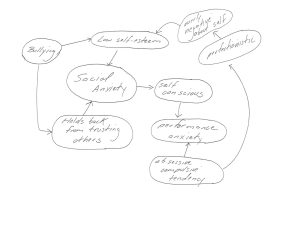As a Tucson psychologist, over the last 20 years my psychology practice has received several thousand reach outs from people seeking help. Commonly a person will say they want counseling, therapy or coaching of some type.
And understandably, sometimes, people are in a rush to start talking with someone. Maybe because they waited too long to seek help, and now they are in a crisis.
Knowing individuals want to find a sustainable solution, rather than a temporary Band-Aid, as a seasoned PhD psychological expert I explain that therapy is a waste of money unless it is guided by a deep and reliable rudder. Otherwise, it is most often no better than a coffee chat with a friend!
Why? The human brain is the most complex organism on planet Earth, and any human emotional or behavioral problem exists within a large network of entrenched emotional and/or behavioral habits. So, if a person wants more than temporary relief, then the relationship between the problem that individual is having (e.g., anxiety or depression), and their existing network of mental habits must be mapped out. If this mapping is never done, then all of the factors causing the problem are never identified.
The unique and irreplaceable value of psychological evaluation
When someone is experiencing a problem like anxiety, that is the problem in the foreground. That problem takes center stage. But meanwhile, behind the scenes, in the background there is a group of factors driving that problem. From about two decades of experience, I can honestly say that most often there are at least four to five different contributing factors that are causing a psychological problem anxiety. Given this reality, you essentially need a flowchart of what factors all point to the problem in the foreground.
The unique power psychological evaluations have is clearly evidenced by the fact that now most elite athletes consult sports psychologists. See my popular blog where I discuss, in greater depth, the unique values of psychological assessment.
Without psychological evaluation, and the use of psychological tools such as advanced psychological measures and interview techniques, a therapist can only guess at what they need to talk to you about. Yes, some therapists conduct intake evalations, but I find those evaluations fall FAR short of the necessary mapping of the background territory. Remember: no therapist has a crystal ball.
As I discussed in a recent blog that went viral, what psychological evaluation does that nothing else can is bring a lantern into the dark cave of your mind. A psychological evaluation operates just like a great detective does, whether it be Sherlock Holmes or Hercule Poirot.
Like Sherlock Holmes, the psychological evaluation identifies how key – but often hidden – facts relate to each other. Another unique result of a great psychological evaluation is an in-depth psychological profile that captures how your predominating personality dynamics relate to the problem in the foreground.
There are many types of psychological evaluations. Here is a sample of evaluations my practice offers so you see the diversity of ways you can use a psychologist.
Let me show you an example of the kind of Mind Map I commonly use to make my treatment the most cost effective (click on image to enlarge):
The above image is a recent mind map that I recently created for a 13-year-old girl. We shall call her Jessica. Jessic came in with her parents because Jessica was having social anxiety. You can follow along by reading this narrative as you look at the above mind map.
As the map shows, I came to identify that the reason for Jessica’s social anxiety was low self-esteem which was caused by many years of bullying she had been experiencing. This bullying caused Jessica to hold back from trusting others, which further exacerbated her social anxiety. Her social anxiety caused Jessica to be highly self-conscious, which in turn caused her to have performance anxiety, especially in the sport she was struggling in.
A further reason for Jessica’s performance anxiety was she had a clear obsessive-compulsive personality tendency, which caused her to be perfectionistic and overly negative about herself. For example, she over focused on parts of her body she did not like, which was a key reason she was having slow self-esteem.
This map allowed Jessica and I to look at this mind map and together discuss how her foreground issues related to these background factors. This mind map allowed us to go on and efficiently work together where her problems were solved within 10 meetings.
Without a mind map like this, counselors, therapists or life coaches tend to only slowly develop a sense of what problems are causing an issue like social anxiety. Too many professionals who do counseling related work think that they can rely on their charisma, kindness or past life experiences to help people with serious psychological problems. The cold hard truth is no amount of caring can take the place of a well engineered tratment plan driven by a mind map resuting from great detecrive work.
In the case of Jessica, this visual mind map helped her and her parents grasp why Jessica was experiencing so much anxiety. For an adolescent, it is a tremendous relief when they can “see” how their mind operates. Whether you are an adult of child, a mind map powerfully energzies a tactical, multi-pronged approach so counseling is methodical versus conversationally shallow.
Great psychological evaluation allows therapy to accomplish what you need in a much shorter time, which often will save you a mountain of money. Unfortunately, a large amount of those doing therapy have lower levels of training in psychologival evaluation, and thus they might naively start treating without an truly in-depth evaluation.
The bottom line is no amount of talk therapy will help you long term unless a map of how your mind operates is first created through true detective work. This is why, most often, great therapy depends on great evaluation.
Psychological problems cause people to make rash decisions
Many people who are seeking psychological assistance feel anxious, and sometimes are even frantic. These struggling individuals will try to find anyone who says they are a counselor or therapist who they can get into the quickest. By the way the term “counselor” is not a legally protective term in many states so anyone can call themselves a counselor. Even you. Meanwhile the term “psychologist” is reserved for those with a specific amount of specialized and advanced training.
The heat of the moment nature of people in psychological duress drives them to make rash decisions. Since global corporations are now getting involved in therapy by offering online therapy options, individuals often mistakenly think that just because a counselor is ready at any moment to talk to them, that means the treatment is going to be helpful. Fact: countless times people come to my office after having used an online therapist or counselor with a low level of training, telling me that after six months or even years of counseling they feel no better. Read my blog about four signs to look for of a great therapist.
Since I am not only a clinical psychologist but a forensic psychologist who testifies court, I have reviewed the work of hundreds of counselors and therapists over two decades. I can honestly say that a large amount of therapeutic work results in wasted money and time because that therapy never began with a deep and reliable mind map rudder.
Yes, psychological evaluation costs money, but ineffective therapy costs alot more. Not only in dollars, but due to the treendous costs of ongoing emotional duress. Don’t let your duress convince you that the most available person is the best person.
Bottom line
There is no way around the fact that therapy is most often a waste of money when it is not driven by a rudder that is handcrafted through the process of psychological evaluation.
You need to shop carefully, and this is why I wrote a blog helping you know the exact questions you can use to interview a potential mentor, therapist or counselor.
Related Blogs:
4 criteria to find a great therapist
Great child psychological assessment exceeds diagnosis


